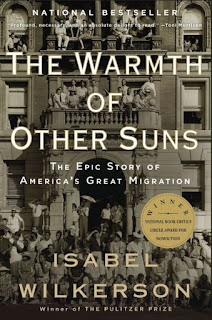I just finished reading a powerful book: Isabel Wilkerson's The Warmth of Other Suns. Wilkerson, a Pulitzer Prize-winning journalist, profiles three African Americans born in the South in the second decade of the 20th century. All three moved away: one to New York, one to Chicago, one to Los Angeles. The men died in the 1990s. The woman died in 2004. Unless you are very young, they all lived during your own lifetime. Unless you are a person of color, their experiences may startle you.
I am 70 years old. I was in third grade when Rosa Parks kept her seat in the bus, had just finished high school when LBJ signed the Civil Rights Act, was a college student when race riots broke out all across America, and had just gotten married when Martin Luther King was assassinated. I was appalled by racism without realizing I had spent my life in an extremely white bubble whose privileges were built on a racist past.
As a well-educated white woman, I wanted black people to be able to ride in the front of the bus and eat at lunch counters, of course; but I was completely unaware of the daily hardships, insults, and real dangers that provoked the civil rights movement, in both North and South. And I certainly didn't know the extent to which racism continues to exist.
Nearly five years ago I moved from a county that is 5% African American to a county that is 29% African American. I live walking distance from a city that is 63% African American. From new friends, I have learned something that should have been obvious all along: that as a white woman, I can't begin to imagine what it's like to be a woman of color. Things that happen to my black friends do not happen to me. It's been easy for me to assume they don't happen at all, or at least happen extremely rarely. I had no idea.
I've tried to educate myself by listening, watching, and reading. The more I learn, the more I realize I need to learn. Humility is painful: I will never know what it's like to be black in America. I do know, however, that I learned a lot from The Warmth of Other Suns. It's not a history book, though from it I learned parts of history that were somehow not covered in my undergrad history major. It's not a sociology book, though I couldn't miss seeing how the protagonists' social context affected their lives. It's not a political argument, though politicians show up in its pages from time to time. The book is a carefully researched story of three lives, told mostly in their own words. And it's not fiction.

1 comment:
Post a Comment